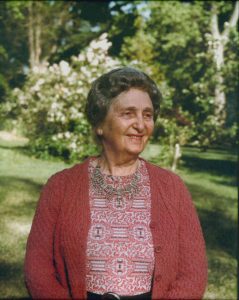Olga Umansky, MLIS, is a librarian and archivist of the Hanns Sachs Library at BPSI. Her remarks below originally appeared in the Winter 2021 issue of the library newsletter, which can be read here.

Several archival researchers have recently looked into Jenny Waelder-Hall’s materials at BPSI. Klara Naszkowska, PhD, a Fulbright and Visiting Scholar at Union Theological Seminary, Columbia University has requested Waelder-Hall’s interviews for her spring seminar about Jewish women émigré psychoanalysts who came to the United States in 1930s. Georg Augusta, a psychoanalyst from Vienna, asked about Waelder-Hall in his attempt to find all known photographs of the First Stockbridge Congress on Child Analysis organized by the Austen Riggs Foundation in April 23-24, 1950. In addition to an official group photo held at Countway Library of Medicine, there are many candid pictures taken on the same day. Dr. Augusta suggested that the Stockbridge photos provide a window to the understanding of what Vienna has lost and what it meant for the emigré analysts to flee Europe, show their influence on American analysts and on the emancipation of women, as women constitute the majority of the Stockbridge Congress assembly. Explorations in BPSI Photograph collections, uncovered an unidentified portrait of a woman (shown here). Our member Tony Kris, MD, as well as our archival researcher Karin von Hippel, PhD (Waelder-Hall’s granddaughter), confirmed that the woman on the photo is Jenny Waelder-Hall in her later years.
Jenny Waelder-Hall (1898–1989) was a pioneer of child analysis and a Training and Supervising Analyst at the Vienna Psychoanalytic Society. She immigrated to the US after the Anschluss of 1938 and lived in Boston until 1943, playing an important role as a training analyst at the Boston Psychoanalytic Society. According to Sanford Gifford, she helped the Bibrings come to Boston by assisting Edward Bibring in obtaining professorship at Tufts. Born Jenny Pollack in Lemberg (now Lviv), she was the second daughter in a Jewish assimilated family. After Lemberg’s defeat in WWI, the family moved to Vienna where Jenny attended the Vienna University Medical School. She became interested in psychoanalysis through one of her classmates, Grete Bibring. In 1924, she began her supervision with Anna Freud and two years later they began working with children. One of the first cases assigned to Jenny Waelder-Hall by Anna Freud is described in her paper The Analysis of a Case of Night Terror, translated and published in English in 1946. By the 1930s, she was conducting her own child analysis seminars often attended by American students trained in Vienna. In 1930, she married Robert Waelder, a physicist and inventor who trained in Vienna to become an analyst. The Waelders were later welcomed in Boston by a younger generation of American analysts they had met in Vienna: William Healy, Augusta Bronner, Helen Tartakoff, Florence Clothier, Lydia Dawes, John Murray, and Joseph Michaels. The couple split in 1941, but remained friendly. Jenny Waelder married historian Duncan Hall, following him to Washington, DC, in 1943, where she quickly became a training analyst at the Baltimore-Washington Psychoanalytic Institute. Gifford’s biography and interviews suggest she never liked to write, but was a brilliant analyst, teacher and supervisor.
References:
Gifford, S. (2017). Jenny Waelder-Hall and Early Child Analysis. American
Imago, 74(4), 451-465.
Olga Umansky can be contacted by email here.
***
The opinions or views expressed on the Boston Psychoanalytic Society & Institute (“BPSI”) social media platforms, including, but not limited to, blogs, Facebook posts and Twitter posts, represent the thoughts of individual contributors and are not necessarily those of the Boston Psychoanalytic Society & Institute or any of its directors, officers, employees, staff, board of directors, or members. All posts on BPSI social media platforms are for informational purposes only and should not be regarded as professional advice.
BPSI does not control or guarantee the accuracy, relevance, timeliness or completeness of information contained in its contributors’ posts and/or blog entries, or found by following any linked websites. BPSI will not be liable for any damages from the display or use of information posted on its website or social media platforms. BPSI cannot and does not authorize the use of copyrighted materials contained in linked websites.

